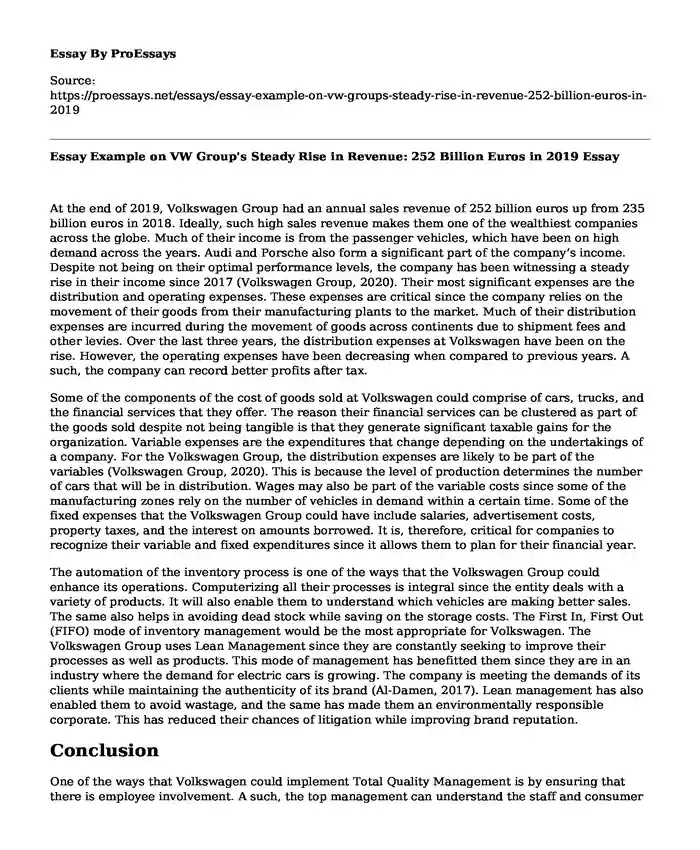At the end of 2019, Volkswagen Group had an annual sales revenue of 252 billion euros up from 235 billion euros in 2018. Ideally, such high sales revenue makes them one of the wealthiest companies across the globe. Much of their income is from the passenger vehicles, which have been on high demand across the years. Audi and Porsche also form a significant part of the company’s income. Despite not being on their optimal performance levels, the company has been witnessing a steady rise in their income since 2017 (Volkswagen Group, 2020). Their most significant expenses are the distribution and operating expenses. These expenses are critical since the company relies on the movement of their goods from their manufacturing plants to the market. Much of their distribution expenses are incurred during the movement of goods across continents due to shipment fees and other levies. Over the last three years, the distribution expenses at Volkswagen have been on the rise. However, the operating expenses have been decreasing when compared to previous years. A such, the company can record better profits after tax.
Some of the components of the cost of goods sold at Volkswagen could comprise of cars, trucks, and the financial services that they offer. The reason their financial services can be clustered as part of the goods sold despite not being tangible is that they generate significant taxable gains for the organization. Variable expenses are the expenditures that change depending on the undertakings of a company. For the Volkswagen Group, the distribution expenses are likely to be part of the variables (Volkswagen Group, 2020). This is because the level of production determines the number of cars that will be in distribution. Wages may also be part of the variable costs since some of the manufacturing zones rely on the number of vehicles in demand within a certain time. Some of the fixed expenses that the Volkswagen Group could have include salaries, advertisement costs, property taxes, and the interest on amounts borrowed. It is, therefore, critical for companies to recognize their variable and fixed expenditures since it allows them to plan for their financial year.
The automation of the inventory process is one of the ways that the Volkswagen Group could enhance its operations. Computerizing all their processes is integral since the entity deals with a variety of products. It will also enable them to understand which vehicles are making better sales. The same also helps in avoiding dead stock while saving on the storage costs. The First In, First Out (FIFO) mode of inventory management would be the most appropriate for Volkswagen. The Volkswagen Group uses Lean Management since they are constantly seeking to improve their processes as well as products. This mode of management has benefitted them since they are in an industry where the demand for electric cars is growing. The company is meeting the demands of its clients while maintaining the authenticity of its brand (Al-Damen, 2017). Lean management has also enabled them to avoid wastage, and the same has made them an environmentally responsible corporate. This has reduced their chances of litigation while improving brand reputation.
Conclusion
One of the ways that Volkswagen could implement Total Quality Management is by ensuring that there is employee involvement. A such, the top management can understand the staff and consumer needs while addressing them as they arise (Al-Damen, 2017). The adoption of total quality management will allow the entity to benefit from quality leadership, better process administration, and enhanced organizational performance.
References
Al-Damen, R. A. (2017). The impact of total quality management on organizational performance Case of Jordan Oil Petroleum Company. International Journal of Business and Social Science, 8(1), 192-202. http://www.ijbssnet.com/journals/Vol_8_No_1_January_2017/20.pdf
Volkswagen Group. (2020). Volkswagen group. https://www.volkswagenag.com/en/group.html
Cite this page
Essay Example on VW Group's Steady Rise in Revenue: 252 Billion Euros in 2019. (2023, Sep 27). Retrieved from https://proessays.net/essays/essay-example-on-vw-groups-steady-rise-in-revenue-252-billion-euros-in-2019
If you are the original author of this essay and no longer wish to have it published on the ProEssays website, please click below to request its removal:
- Essay on Working Effectively With Others
- Accounting: Organizational Tax and Research Planning Paper Example
- Marketing Philosophy of Amazon Paper Example
- Essay Sample on Unlocking the Power of Organizational Culture: A Guide to Impactful Change
- Essay Example on Ethical Considerations: An Essential Part of Business Success
- Leadership: Ethical vs. Unethical - Essay Sample
- Culture: Communicating Art Through Collective Ability







